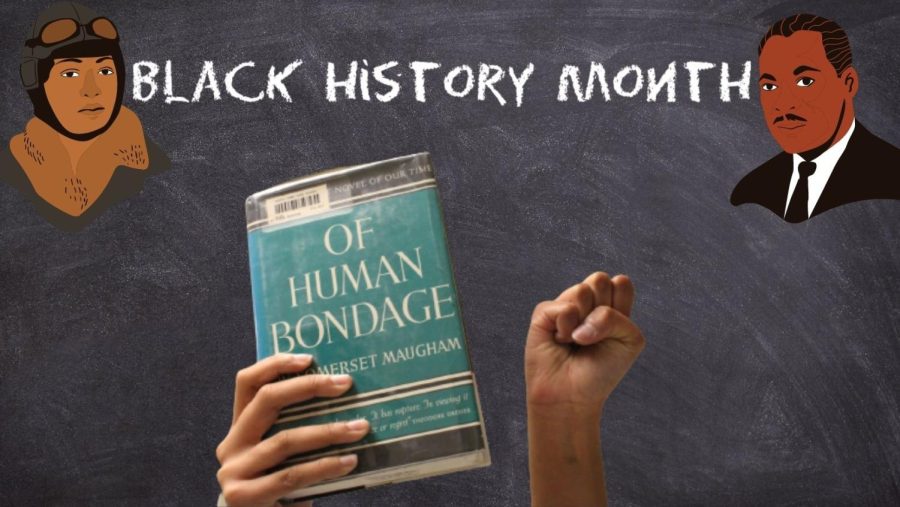Belittling Black history
The vast majority of people know of popular Black history pioneers such as Harriet Tubman and Martin Luther King, Jr. However, people should expand their horizons on the wide variety of Black historical figures. Black people impacted history using skills ranging from music and art to math and science. Schools should also require the teaching of Black history aside from the well-known figures.
March 8, 2022
When talking about Black history, people commonly refer to activists such as Rosa Parks, Martin Luther King, and Malcolm X. However, people should expand their knowledge on additional people who impacted the Black community. No matter how small the impact, people should educate themselves on the multitude of Black historical figures.
Skeptics can partially blame the school systems for students’ lack of black historical activists. The Federal Government does not mandate the teaching of Black history. A 2015 study conducted by the National Museum of African American History and Culture and Oberg Research, showed that on average, schools only devote 8% or 9% of history class time to Black history. States such as Texas refrain from teaching Black history in general. Of course, students typically know of Harriet Tubman and Rosa Parks, but lack knowledge on the civil rights movement or people who simply impacted Black history.
“Shirley Chisholm is one of my favorite underrated Black historical figures. I love her because not only was she the first black woman to be elected to congress but she was also the first black woman to run for the presidential nomination. She was also a huge advocate for African American education,” magnet junior Jerrica Arnett said.
On June 15, 1921, the avid aviator Bessie Coleman became the first black woman to earn her pilot’s license. From helping her mother do laundry to becoming a manicurist at a local nail shop, Coleman grew up in a poor household. However, after hearing her brother’s stories about French women flying planes, she began her journey to become a pilot. Because of segregation, American flight schools did not accept Coleman’s applications, so she decided to learn French and apply to the Caudron Brothers’ School of Aviation in Le Crotoy, France.
After her acceptance, her aviation career took flight. During the mid-1920s, she performed public flights doing tricks and stunts in her Jenny – JN-4 plane. For her performances, she demanded that the stadium set up one gate so everyone could come in and watch her perform regardless of their race. Following her death, African American female aviators remembered her accomplishments by forming the Bessie Coleman Aviators Club as well as the creation of the Bessie Coleman Stamp.
People rarely talk about John Baxter Taylor Jr., the first Black man to ever win an Olympic gold medal. Born in Washington D.C, Taylor attended Central High School and took part in the track team there. After graduating he attended Brown Preparatory School where he became a part of the invincible track team that never lost a race. During his time in college, he held the record for the longest stride in the world and set the record for 48.6 seconds for 440 yards. After graduating from college, Taylor participated in a plethora of races including the 1908 Olympic Games where he won his Olympic Gold Medal and accomplished a historical feat for the Black community.
Related to the famous Black actress Taraji P. Henson, Matthew Henson contributed greatly to the discovery of the North Pole. In contrast to his white partner, people rarely talk about or remember his accomplishments. Henson led a life of exploration as a part of the first generation of free Black people. Explorer Robert Edwin Peary invited Henson on his conquest to reach the North Pole. Prior to their successful conquest, Henson did not receive the recognition he deserved for his accomplishment, but now people should remember him as one of the first black men to discover the North Pole.
Nina Simone heavily impacted the black community with her activism and gift of singing. However, people rarely name her when talking about influential black artists in history. In 1963, Nina Simone wrote her first protest song named Mississippi Goddam that referred to the gruesome events that happened in the south during the civil rights movement. Simone also faced racism and discrimination in her efforts to be a concert performer which encouraged her to act as a voice for the civil rights movement and against racism. Her 1996 song, Four Women refers to the four women killed in the bombing at the 16th street baptist church in Birmingham, Alabama. Using her strong voice and dramatic style of signing, she helped black people express their anger towards racism.
“Picket lines, Schoolboy cots, They try to say it’s a communist plot. All I want is equality for my sister, my brother, my people, and me. Yes, you lied to me all these years. You told me to wash and clean my ears, and talk real fine just like a lady, and you’d stop calling me Sister Sadie,” Nina Simone in Mississippi Goddam said.
Black historical figures such as these deserve recognition simply because they helped impact the Black community. People should not measure someone’s influence by their popularity, but instead by their impact. Only discussing the popular black historical figures belittles the little-known ones who also impacted Black history. Although Bessie Coleman and John Taylor didn’t organize protests like Martin Luther King (MLK) or preach Black nationalism like Malcolm X, their impact means just as much to the Black community.





Hazel Lloyd • Mar 18, 2022 at 4:47 PM
This article has great information regarding American history that is not taught in schools. This important history not just black history. Such an enlightening article.
T. Mcbride • Mar 17, 2022 at 1:27 PM
Thank you for sharing ; A part of history that little that We know and so much more .
Elvina Melendrez • Mar 17, 2022 at 12:38 AM
What an awesome article. Bringing to light the lies , lack of recognition, that still
In 2022 does not share the truth regarding some of the greatest contributions from black race . Thank you Ren for sharing a small bit of the enormous contribution ,inventions, life saving technology and many other creations that WORLD still tries to hide who the real minds are….
Naeemah Seals • Mar 16, 2022 at 12:57 PM
Wonderfully written Ren!